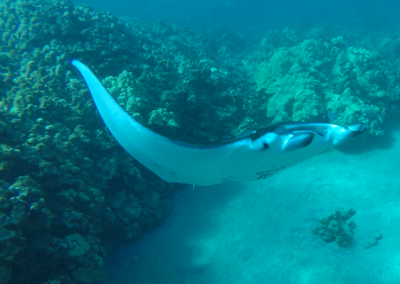Hawaii's Sunscreen Ban: A Good Law or More Needless Government Meddling?

On July 3, Hawaii became the first state to ban the sale of sunscreens considered harmful to coral reefs. The bill received bipartisan support. Banned sunscreens contain the chemicals oxybenzone and octinoxate, which, as I'll explain in a moment, can harm coral. Personally, I'm against excessive environmental regulations that keep people from enjoying creation and shut down businesses for no good reason. So, if you are still reading, please use this as an opportunity to educate yourself on marine ecosystems and what you can do to keep them, and yourself, healthy.
I'd Like My Water Clear and Pure, Please
Some marine creatures are extremely hardy. Corals are not. Experienced marine aquarists know firsthand the difficulties of keeping corals alive. Filter feeders, corals demand proper light levels and near-perfect water quality. Corals share an amazing symbiotic relationship with algae. Known as zooxanthellae, the algae's photosynthesis products provide food for the coral animal. In turn, the coral provide shelter for the algae.
Zooxanthellae need sunlight. But recently, a team of researchers from Haereticus Environmental Laboratory discovered the sunlight-blocking properties of chemicals like oxybenzone are bad for corals. A scientific paper published in 2016 reveals some coral species start dying at concentrations as low as 62 parts per trillion (nanograms per liter).
A Sunscreen Sheen
According to the 2016 paper, research began after a local resident mentioned to lead scientist C.A. Downs that the visible sheen of sunscreen they were observing on the surface of Trunk Bay could be damaging the coral. In the U.S. Virgin Islands, Trunk Bay's coral population has been on the decline for over 25 years now. It receives very little human impact from known coral killers like sewage and other nonpoint source pollutants. However, up to 2,000 visitors per day come to play in its beautiful waters. Scientists measured bay water oxybenzone concentrations and found levels as much as 22,500 times higher than those known to kill coral.
Sunscreen-induced coral damage appears most problematic in small, enclosed bays that are also popular tourist destinations, like Trunk Bay or Oahu's Hanauma Bay. While some may suggest closing these areas to human activity, a better solution would be to either use no sunscreen (and more clothing), or approved, "reef safe" sunscreens.
"Reef safe" sunscreens are typically mineral sunscreens containing zinc dioxide and/or titanium dioxide. However, according to the Haeraticus Lab, mineral sunscreens should not contain nanoparticles, which are particles smaller than 100 nm. Mineral nanoparticles used in sunscreens are known to produce short-term stress on some corals.
Oxybenzone, It's Not Just Bad for Corals
Personally, I've never met anyone who hates clear, blue water and thriving coral reef communities. No, we all love places like these. I would argue we need places like these. But we shouldn't have to close them because we love them, or the profits from park entrance fees, too much. Instead, when the red flags start waving about a chemical in sunscreens that could harm coral reefs, then we would be wise to stop using those sunscreens.
Active ingredients in sunscreens are notoriously bad for people, too. Before oxybenzone and octinoxate, there was PABA, which fell out of favor for several reasons, the main one being that research suggested PABA might increase the risk of cellular UV damage. And oxybenzone, the same chemical that is bad for corals, is also a known hormone disruptor in humans.
An Opportunity to Complain, or Innovate?
As you might imagine, some sunscreen manufacturers and skin care advocates are not happy with Hawaii's new legislation. The Consumer Healthcare Products Association (CHPA) says the legislation is based on "weak science," giving no explanation why the science is weak, only stating that other factors like sewage are more important.
For Hawaii as a whole, this is probably true, as it has a history of big sewage spills. In 2006, a massive, 50 million-gallon spill closed beaches along Oahu's South Shore. And sewage does impact places with high oxybenzone levels like Hanauma Bay, most recently in February 2018. More than likely, reef damaging sunscreens aren't the only factor reducing coral populations in Hanauma Bay.
The Skin Cancer Foundation (SCF) does not outright oppose the ban, but it states that laws reducing the number of sunscreen products are "cause for concern." In general, SCF provides a more rational response than CHPA. Unfortunately, both groups fail to mention the potential harm to humans these sunscreen chemicals pose.
It is important to note that SCF believes clothing, not sunscreen, "is the most effective form of sun protection." Sunscreen, sunglasses, a wide-brimmed hat, and seeking shade are also included. I would also add a face mask and/or neck gaiter, items that are becoming increasingly popular. The American Cancer Society recommends limiting exposure to direct sunlight between the hours of 10 a.m. and 4 p.m.
The SCF statement concludes with a call to innovate and develop better sunscreen products, noting that the Hawaii legislation also emphasizes the need. In the meantime, clothing like rash guards, wetsuits and swim shirts are particularly good sun blockers when engaged in a water-related activity near a coral reef, where sunscreen will eventually wash off anyway.
In our increasingly over-politicized world, avoiding reef-damaging sunscreens while swimming near coral reefs is not a one-sided political issue. It's good stewardship.





















